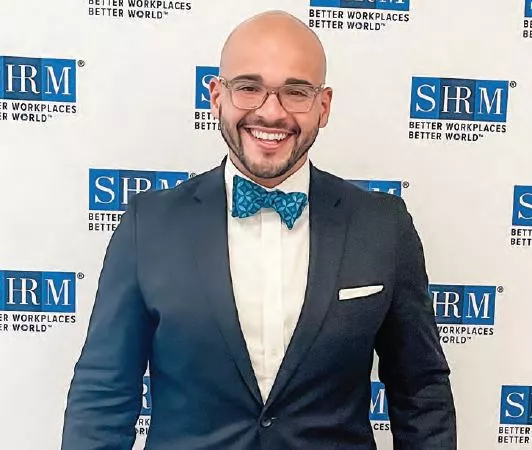By: Kimberly Gladden-Eversley
Vibrant energy surrounds the Hispanic community, from the subtle taste of sazón, the vivacious language and the musical instruments that tell stories without words.
Whether it’s Hispanic Heritage Month or the Puerto Rican Day Parade, chances are, you’ve heard, “¡Que bonita bandera es la bandera Puertorriqueña!” Meaning what a beautiful flag the Puerto Rican flag is. These lyrics became an anthem in the Hispanic community, representing the love, admiration and pride deeply rooted in the foundation of who they are.
Puerto Rico is one of 21 Hispanic countries worldwide and home to Miguel Joey Aviles, who is now an award-winning Hispanic Heritage Month speaker, consultant and diversity, equity and inclusion (DEI) coach. During SHRM’s (Society for Human Resource Management) Diversity and Inclusion conference, Aviles provided the roadmap to face any crisis with the Hispanic community’s top core value: ¡superación! “Superación translates to advancement, growth, self-improvement, going to the next level, and we’re seeing that across the community,” said Miguel Joey Aviles.
Unfortunately, his journey to the next level required more than a degree in Business Administration, Human Resources and Marketing. Aviles had to suppress and modify who he was to get to where he is today. “Building a career in the federal government requires a lot of shifting; there were times that I had to maneuver my authenticity,” said Aviles. “I used that to access places that otherwise were not going to give me access … once I was inside, I was like, I got this, then I brought the whole thing!”
Despite his highly recognizable strategy often used within immigrant communities, Aviles had no intention of leaving his Hispanic community behind. Instead, he continued to water his roots until it was the right time to share its growth with the world. Today, his voice, accent, native language and appearance, which once served as forms of discrimination, have become the stepping stones for the new generation. Now he fights for their right to come as they are. “Rather than seeing these types of diversity or uniqueness as a problem that needs to be fixed, we got to see it as a transformational mechanism to achieve our missions,” said Aviles. “We got, collectively, to sit down and stop equalizing English proficiency means competence,” he continued. “That mentality must be changed if corporations want to be relevant tomorrow.”
To fight against performative diversity, the act of inauthentically performing for inclusion without action, starts with Miguel Aviles’s roadmap. M — for the mission, A — for action and P — for progress. “Find organizations that have authentic decades-long relationships with their community; you as an organization cannot fake that,” said Aviles. “Find the organization that is connected to your organizational core values, to your mission and partner with them, and when you go hand by hand with them, the doors will be open to you,” he continued.
Cultural intelligence, humility and competence cannot be taught; it is learned through life experiences. Meanwhile, it takes creating policies to protect victims of systemic discrimination to increase access to equal opportunities. “There are organizations … taking policy decisions without having representation in the room …” said Aviles. “No decision should be taken without having both on the table,” he continued.
Readiness programs and initiatives like internships, sponsorships and mentorships, serve as the invitation to take definitive action at the table. Aviles credits his success and access behind doors that were too big to open on his own to his sponsors and mentors. Now, he recommends that members of the Latin and Hispanic communities do the same and nurture community-building relationships. This time, with genuine authenticity to provide groundbreaking change without hiding who you are. “I don’t have to leave who I am. I can be 100% American, 100% Latino, 100% Black, Indian and you name it. I can be both!”
Photo credit: Courtesy of Kimberly Gladden-Eversley



